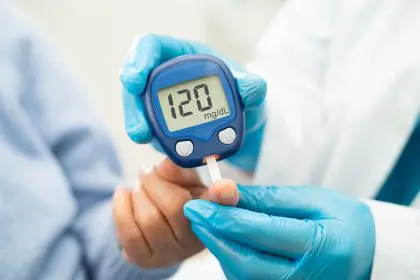In an insightful conversation with rolling out Health IQ, Lester Piri, Pharm.D., a pharmacy manager with extensive experience in community health, shares his expert knowledge on diabetes. From common misconceptions to cutting-edge treatments, Piri offers a comprehensive overview of this widespread condition, emphasizing the importance of education, lifestyle changes and accessible care. Drawing from his background in chemistry and pharmacy, as well as his involvement in community health initiatives, Piri provides valuable insights into the complexities of diabetes management and the promising advancements in technology and medication that are shaping the future of diabetes care.
[Editor’s note: This is a truncated version of a longer video interview. Please see the video for the extended version. Some errors may occur.]
Can you talk about your background and how you got to where you are in your profession?
Sure. So I obtained my undergraduate degree in chemistry at Alabama A&M University in Huntsville, Alabama. After graduating, I migrated to Atlanta, Georgia, and pursued my doctorate in pharmacy at Mercer University, Atlanta’s campus. During those years at Mercer, I was interning with Walmart Pharmacy. After graduation, I obtained a full-time position as a staff pharmacist at Walmart, and I have recently been promoted to pharmacy manager. While I was at Mercer, I was part of a couple of organizations like Snaffa, where I was involved in Operation Immunization.
I was also part of Operation HARP, where I did a lot of service learning projects with the community, providing shots. Luckily, and unfortunately, I was also able to provide a lot of COVID immunizations. I will say it’s fortunate because we were able to save a lot of lives and protect the community. It was just unfortunate that it was during that time. During Operation HARP, we also did a lot of events, partnering with barbershops, talking to men of all ages and answering any questions they had about heart disease, diabetes, hypertension and hyperlipidemia, just being able to provide any type of insight that we could.
What are your thoughts on diabetes in the community, and what are some misconceptions about diabetes and medication?
That’s a very good question. When it comes to diabetes, a lot of people usually think that it affects the Black community the most, which it does, but statistically, it affects all races and ethnicities. As a pharmacist part of the community, I’m able to see patients from all types of races. To be honest, throughout the board, it’s almost an even amount of all patients who are receiving diabetic medications or some type of diabetic treatment. So, it’s very hard to pinpoint. But it is very important for us to be cognizant that diabetes does affect the majority of the African American community.
It is also very important for us to educate our community about it. When it comes to the misconceptions or misperceptions about diabetic medications, a lot of people are not very fluent in what certain medications treat certain parts of diabetes. There are certain medications that have just come on the market that were originally designed to help lower A1Cs but have been misused for weight loss. That’s another issue because even though that is a part of how the medication works, it has been used by a lot of people who don’t necessarily need the medication, but they want to have the benefits of the medication.
Is it possible to control diabetes without medication?
Diabetes is reversible to an extent. It depends on which type of diabetes we’re looking at. There’s type one and there’s type two. Type one is when your pancreas has almost 100% stopped functioning to the point of not releasing insulin in the body to be able to lower your glucose levels. Type two diabetes is not just about the pancreas losing its functionality, but also your body’s ability to [use insulin], what they call insulin resistance.
Your body is being resistant to the insulin that is trying to be provided by the pancreas. So, it depends on what type you have. Type two is definitely reversible. You’re able to control your A1C levels with proper dieting, proper workouts, and just being cognizant about what types of foods you put in your body and the types of carbohydrates that you consume.
What kinds of carbs should be consumed, and what are some easy replacement meals to start the reversal process?
Yes. A lot of complex carbohydrates versus simple carbohydrates can affect your blood sugar differently. Complex carbohydrates usually make your blood sugar spike. Complex carbohydrates can come from manufactured carbs such as bread — things that aren’t natural to the Earth — like bread, muffins, bagels and buns for burgers and sandwiches. However, there have been some biased studies, but although fruit sugars and vegetables that have sugars are showing that they don’t really affect a diabetic that much, most physicians and primary care providers will advise people to limit them.
It is a complex study, and I don’t want to go too deep into it because I don’t want to have my facts wrong. But the way carbohydrates in fruits and sugars break down is different from when you’re consuming manufactured products. So, it is a tough topic because the facts aren’t all there, but it’s just best to advise people to try to eat carbohydrates that are natural to the earth rather than those that are manufactured.
Is there a certain diet that’s better for diabetes?
Sure. Before we go into the diets, I want to talk about certain foods and fruits that are considered low glycemic. Berries are a very good option for low glycemic fruits. We’re talking about strawberries, blueberries, raspberries and blackberries. I would try to stay away from citrus fruits, and melons are somewhere in between high and low; I would say they’re intermediate. So, they have a good glycemic index but not as good as berries. When it comes to diets, I am a big fan of keto, which is a diet plan that basically restricts certain grams of carbs that you’re consuming every day.
I’ve actually just been trying that for the past couple of days, and it’s too soon to say how good it is, but it makes you feel a lot better knowing that you’re providing your body energy from foods that are high in protein and fats rather than carbohydrates. There are studies showing that your body will be able to burn a lot of fat and lose weight from these keto diets. So, I’m a big fan of keto.
What are some thoughts on medications and technology for diabetes management?
OK. So when it comes to medications, a lot of providers have usually practiced by guidelines that are provided by higher-up organizations. I can’t think of the organization that created this certain guideline, but first-line medications for decades have been metformin. That’s a very common medication, and anybody who’s diabetic has heard of metformin. But now guidelines have changed. The fact is that medications that are used now as first-line treatments are Ozempic, Mounjaro, and all your injectable GLP-1s.
Now, I’m not a fan of them. However, they do show beneficial effects for almost 90% of the consumers. The reason why I’m not a fan is that, being a retail pharmacist or a community pharmacist, I am concerned about accessibility — specifically, the point that people can afford the medication. These medications are expensive, especially if you don’t have insurance. If you don’t have insurance, you’re looking at $1,000 just for a month’s supply. If you’re lucky enough to get the manufacturer coupon, it can bring it down to $550.
Now, I’m seeing $650 for most patients. So, I hate the fact that the guidelines are encouraging doctors to prescribe these, even though they are so good. They’re just too expensive for most people. There are other medications that are still out there that are very good for use. We’re looking at metformin, glimepiride, glipizide, and pioglitazone. These are all medications that are proven for diabetics to help their bodies use their natural insulin to bring down glucose levels. Type 1 diabetics, unfortunately, have to use insulin because of their condition.
What are your thoughts on wearable technologies like Dexcom and Freestyle Libre?
I’m a big fan of them. A lot of people don’t like pricking their fingers, especially once they start using one of those monitors called CGMs —continuous glucose monitoring systems. Once people start using them, it’s so hard for them to let go of them, and I don’t blame them. It’s convenient. You can check your glucose on the go without having to bring your kit with you and without having blood all over your fingers. So, it’s very neat. But that also goes back to what I mentioned earlier about accessibility. A lot of insurance companies are very particular about covering those.
You have to meet a lot of criteria to qualify for them. But if they became more accessible through a lot of insurance plans, I think it would be an amazing innovation for the diabetes community. I sell a lot of those at my store; I have never gone a day without selling at least one. They can become expensive over time, but it’s a great piece of technology. That just shows the advancement of health technology that we’re able to live through.












